








EDITOR -IN-CHIEF: Bella Hughes
MANAGING EDITOR: Emma Love
COPY CHIEF: Caden Dyer
NEWS EDITOR: Shelby Wright
ARTS & CULTURE EDITOR: Emma Caskill
SPORTS EDITOR: Caleb Jarreau
ASSISTANT SPORTS EDITOR: Trevor McGee
OPINIONS EDITOR: Ansley Graves
PHOTO EDITOR: Erick Gomez-Villeda
DESIGN EDITOR: Ciara Chauncey
ENGAGEMENT EDITOR: Sarah Portanka
COVER DESIGN: Ciara Chauncey
PAGE DESIGNERS: Emma Fingeret, Jibril Foronas, Ashley Cammarota, Abigail Thompson
ADVERTISING MANAGER: Cullen Askew
ADVERTISING REPRESENTATIVES: Jacob Stromatt
ADVERTISING PRODUCTION ARTISTS: Donatella Thomas
TO REPORT A NEWS ITEM OR SUBMIT A PRESS RELEASE, please email editorinchief@utdailybeacon.com or call (865) 974-2348
TO PLACE AN AD, please email admanager@utk.edu.
LETTERS POLICY: Letters to the Editor must be exclusive to The Daily Beacon and cannot have been submitted to or published by other media. Letters should not exceed 400 words and can be edited or shortened for space. Letters can also be edited for grammar and typographical errors, and Letters that contain excessive grammatical errors can be rejected for this reason. Anonymous Letters will not be published. Authors should include their full name, mailing address, city of residence, phone number and e-mail address for verification purposes. Letters submitted without this information will not be published. The preferred method to submit a Letter to the Editor is to email the Editor-in-Chief.
CORRECTIONS POLICY:It is the Daily Beacon’s policy to quickly correct any factual errors and clarify any potentially misleading information. Errors brought to our attention by readers or staff members will be corrected and printed on page two of our publication. To report an error please send as much information as possible about where and when the error occurred to managingeditor@ utdailybeacon.com, or call our newsroom at (865) 974-5206.
The Daily Beacon is published by students at The University of Tennessee on Wednesday during the fall and spring semesters. The offices are located at 1345 Circle Park Drive, 11 Communications Building, Knoxville, TN 37996-0314. The newspaper is free on campus and is available via mail subscription for $200/year or $100/semester. It is also available online at: www.utdailybeacon.com

BELLA HUGHES Editor-in-Chief
To me, identity is too complex to capture in a single definition. Identity is an extension of who you are, what you enjoy, what makes your heart flutter and your biggest passions.
In middle school, my language arts teacher made us write an “I am” poem supported by a word cloud. Essentially, it’s a poem of short phrases that describe how we identify. My first two points read, “I am tall” and “I am loyal.” 10 years later, these are still key attributes that I take pride in.
This word cloud introduced me to the importance of affirmations and self-love.
In the spring, the Beacon introduced an identity section. The former EIC and I realized that many of the groups on campus and the stories we told had primary themes of self-discovery, finding community and individual uniqueness.
Since then, we’ve produced pieces centered around religion, sexual orientation, race, and fashion. Traditionally, we produce a special issue in October dedicated to Pride
History Month. This year, I wanted to expand on that idea and further our identity section by creating content about all realms of identity.
Pride History Month is vital in the recognition of the activists, trailblazers, couples, communities and friends involved in LGBTQ+ relationships. It is a part of one’s identity which inspired this issue.
Identity is not a monolith. It is something that is expressive and ever-changing. Who you are today, at your core, may stay the
same, but the people you meet along the way, the relationships you build, the lessons you learn and experiences you have will continue to form who you are. How lucky are we as people to be able to say that — to look foward to the future.
This special issue is for you — wherever you are in your identity journey. I encourage you all to make a word cloud for yourself. Who are you today? Who will you be tomorrow?

Bella Hughes encourages students to use a word cloud to reflect on one’s identity. Courtesy of Bella Hughes
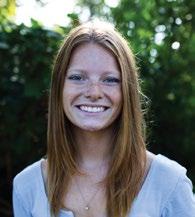
EMMA LOVE Managing Editor
I’m a sucker for the definitions of words, so when sitting down to write a letter on the topic of identity, I decided it was critical to find and state the definition of the word.
Psychology Today defines the concept of identity as the combination of “memories, experiences, relationships, and values that create one’s sense of self.” To me, values and relationships play the most major roles in forming my identity, and those then inform my memories and experiences.
There probably aren’t very many people who would say that part of their identity comes from a love for — or value of — word rules and punctuation marks. But I’m lucky that I found a place on campus where I am surrounded by people who share that interest.
Maybe it sounds like a stretch to say that having community at the Beacon, a student newspaper that doubles as my workplace, has been so instrumental in
my college experience. Or maybe you’ve experienced something similar and understand how community can have such an impact on your life.
Every UT student deserves to have a community on campus — a safe one. They (you) deserve to have one in which they feel seen, heard and, dare I say, understood on a regular basis.
What defines you as a person? Think deeply about what your identity is and where it comes from. Consider your values, your relationships, your experiences, your memories.
Then, find a place on campus where you can express that identity. Revel in the camaraderie and security it brings you. I promise it’s worth it.
This special issue is all about identity in its many different forms. We tried to find stories that encapsulate the various identities present in UT’s student population through authentic student voices from around campus.
Inside you’ll find a story about how a set of twins distinguish themselves as individuals, a column about ADHD awareness and a listicle about fictional characters with distinct identities who were ahead of their time.
We hope this issue finds you with an
open mind and inspires you to embrace your own identity on and off campus.

conversation between classes in the Student Union. Wednesday, Oct. 25, 2024. File / The Daily Beacon
Twins typically share a lot of things growing up — from a bedroom to clothing to birthday celebrations. But as they get older, they face challenges in establishing their individual identities separately from their twin.
For juniors Alex and Sydney Whitman, developing individual identities became easier when they got to college, as they were able to live in different apartments, find separate friend groups, cultivate personal interests and build confidence as unique people.
For the Whitman sisters, identity has demanded effort. While they agree that being a twin is a core part of their identities — and one they take pride in — building confidence as singular people was a focus for each of them coming into college.
As children, they remember being put in the same sports and being part of the same friend group throughout their schooling, which they noted was abnormal for twins at their school. Being friends with all the same people not only perpetuated drama and awkward situations when the sisters were in conflict and confided in a shared friend, but it also caused them to be treated as a unit.
“With our friends, I would say we were just bunched together, so they would just refer to us as ‘the twins,’” Sydney Whitman said.
“The twins” ended up going to college at different universities — Alex Whitman at UT and Sydney Whitman at the University of Kentucky. It was then that they began to find their “own things” that they were interested in as individuals.
That was, until Sydney Whitman decided to transfer to UT this fall. The sisters were worried about how being back in the same school would impact their newfound independence.
“Everyone likes having memories that they feel like are just theirs,” Alex Whitman said. “And since we did share all of that growing up, I was kind of struggling. … It was just hard for me to have to share all the things that I really love about college again — or at least about school in general.”
Alex and Sydney Whitman decided to live separately and embrace the chance to finally have different friend groups. With Alex Whitman majoring in marketing and enjoying outdoor activities and Sydney Whitman majoring

in communications and being more interested in fashion, the twins were able to easily find friends and hobbies separate from each other.
“We do very much have separate friend groups, which has honestly been really helpful for our relationship in general,” Alex Whitman said. “... Especially since getting to college, it’s been a lot easier to be individuals rather than a unit.”
Despite feeling free to live more individual lives and pursue more without each other, the twins have found that they still encounter stereotypes from others regarding their twin status.
Sometimes it’s a playful “can you read each other’s minds,” but other times it’s assumptions about one twin based on what someone knows about the other.
It’s these assumptions that have caused some of the twins’ biggest hardships when attempting to set themselves apart as individual women. They’ve had to grapple with others not perceiving them as two people with
distinct personalities.
“It is hard to find your own identity because people who have met her first have assumptions about me,” Alex Whitman said. “People that have met me first have assumptions about her good or bad.”
Alex Whitman, who said she’s strongly opinionated on many topics, said she’s struggled with people presuming that her sister’s opinions must be hers as well. For Sydney Whitman, the problem has been people immediately liking or disliking one twin based on the fact that they like or dislike the other.
Often related to assumptions, comparison has played a major role in the sisters’ lives — not only by others but also between the twins themselves. Sydney Whitman said it’s nice to have someone to relate to in every stage of life but that being intertwined has frequently bred jealousy between them.
“Since we’re so close, sometimes it would be hard for me to feel happy with my life,” Sydney Whitman said. “I
would compare it so much to hers, and I would also compare myself to her. … So it was just finding my own identity, honestly … and not trying to be exactly my sister.”
Both twins have had to be intentional about expressing their identities and combating the idea that they are “one and the same,” especially with being together at UT this year. But through the independence that college life has granted them, Alex and Sydney Whitman have gained a new appreciation for their lifelong connection.
“It really is a bond that no one else understands unless they are a twin,” Alex Whitman said. “I don’t think there’s anyone that’s closer in my life than my sister. And it’s just really rewarding to see her accomplish everything.”
The Whitmans said they now relish the time they get to spend together and appreciate being close enough to witness and cheer on each other’s individual achievements.
JAXON BERG Staff Writer

Twenty-nine percent of the student population at the University of Tennessee are involved in Greek life. Every individual has their own reason for deciding to join a Greek organization. Whether it be for connections, philanthropy or personal reasons, there can be a place for every person in one of these organizations on campus.
Religion is also a reason why some choose to participate in Greek life. There are several organizations surrounding campus that are religiously affiliated in the Greek community. These organizations are for individuals who want to further their religious goals and can use these outlets to help shape their identities.
Alpha Epsilon Pi is an organization that falls under the Interfraternity Council whose founding principles were Jewish. This fraternity strives to develop the next generation of leaders in Jewish communities. They demonstrate those abilities through brotherhood, Tzedakah, social awareness, and support for Jewish communities and Israel.
“I have focused on keeping our chapter connected with the surrounding Knoxville Jewish community as well as a strong Jewish presence on campus,” Jewish identity chair of Alpha Epsilon Pi Jonah Hodes, a sophomore nursing student, said.
He continued by saying how he has helped his brothers and new members to find spaces to practice their religion within the Knoxville community and within their personal brotherhood.
“It feels great to have something in common with your brothers — especially your religion. It keeps us close, as there is a very small Jewish community on campus,” Hodes said.
They have promoted their Jewish beliefs and planned various events to help others on campus have a space to carry out their beliefs as well, including a Shabbat at their fraternity house,
days to spend Shabbat with local congregations and a vigil to commemorate one year since the Oct. 7 attacks on Israel.
Beta Upsilon Chi, or BYX, is another organization that falls under the UT Interfraternity Council. BYX is a national Christian fraternity that strives to establish bonds of brotherhood and unity among college men based on the shared identity in faith in Jesus Christ.
“BYX has shaped my life by providing me with a group of men who all have their eyes set on the same ultimate goal — the salvation offered through Jesus Christ on Calvary,” A’darius Parrish, a sophomore studying political science, said.
BYX holds various events such as Second Thursday, which is a worship night on the second Thursday of each month, or Bible studies that develop the identities of the brothers in the fraternity. Parrish continued to say that he has become a better friend, student, son, brother and disciple because of his involvement in BYX.
Sigma Phi Lambda, or Phi Lamb, is a sorority on campus that does not fall under one of the four larger councils at the university, but uses the Greek letters to symbolize their organization. Phi Lamb is built on the principles of glorifying God by providing a source of fellowship for Christian college women.
Phi Lamb is a non-denominational organization of sisters who strive to grow in unity with each other because of their shared belief in their God. This identity in Christ is what brings them together as a sisterhood to create a space for their members to freely express their religious beliefs and surround themselves with others who share similar values and goals for their lives.
These are just several examples of organizations on campus that help to shape student’s identities on campus. There are many different areas to get involved around campus and find the place where character and identity growth can occur within and be maintained throughout life.

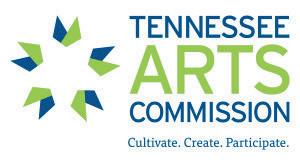
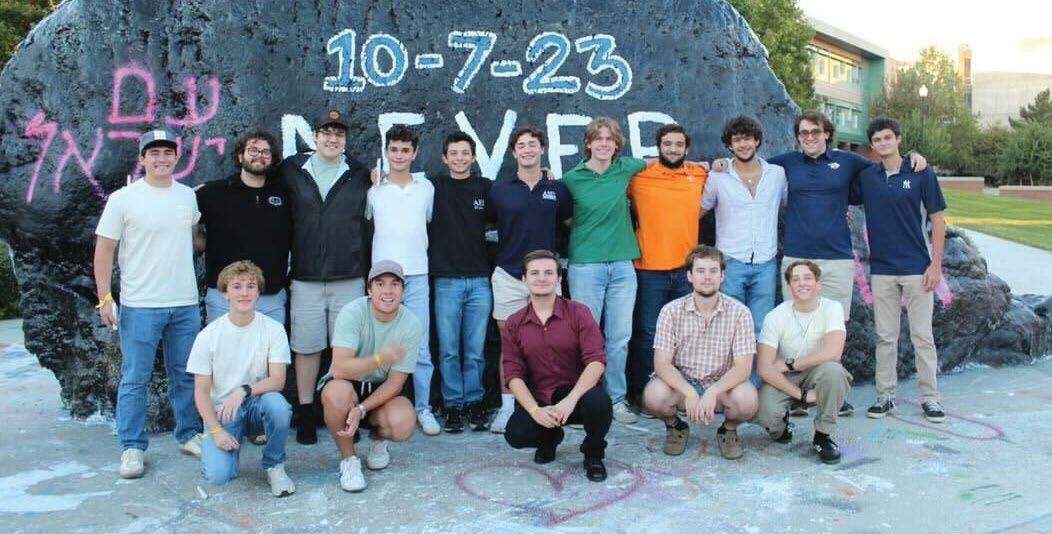
SAMANTHA WHITLEY Staff Writer
UT introduced a new club this semester –the Appalachian Heritage Society.
AHS is an organization that aspires to elevate Appalachian communities, celebrate their voices, and culture and foster sustainability.
Gracie Amburn, a senior studying history, is the president of this association.
After Amburn completed Gabe Schwartzman’s Sustainability in Appalachia course with other members, she felt inspired to explore this subject beyond the classroom and enhance student engagement.
“I founded AHS because I felt as if there was a lack of Appalachian community and representation on campus,” Amburn said. “We have several classes in several departments relating to Appalachia, but no unified place for people to discuss or share between departments.”
The Appalachian region, which includes Tennessee, recently faced devastation due to Hurricane Helene. This hurricane has been described as the largest natural disaster in terms of geographic impact on the Appalachian Trail in its 100-year history.
Mazdyn Miller, a senior majoring in geology and environmental studies, grew up in East Tennessee. She spoke on how the hur-
ricane personally impacted her.
“My heart hurts, and it has not stopped hurting since Hurricane Helene hit Appalachia,” Miller said. “These places that have been impacted are places that I know, that I’ve visited for years, and suddenly, they’ve been wiped off the map.”
Fortunately, members in this club are willing to put in the effort to help with Hurricane Helene’s damage.
“There aren’t really any words I personally have to sum up the unimaginable loss Appalachia has faced at the hands of Hurricane Helene,” Amburn said. “We as a club are currently trying to organize some sort of a fundraiser on campus to raise money for hurricane victims.”
Emma Patterson, a junior studying history, is the co-vice president of the club. She spoke about the importance of ongoing support for the affected communities.
“Soon enough some of the bigger events for donation and awareness will die down, but the need will still be there,” Patterson said. “We want to make sure the disaster keeps getting the attention it needs, weeks and months after primary disaster relief efforts have stopped.”
Not only was this area physically impacted, but the cultural significance of the Appalachian community often goes unnoticed.
Despite Patterson’s deep roots in the Ap-
palachian area, she said she tends to overlook the region by viewing it through a narrow lens. It’s easy for anyone to neglect the fact that Appalachia is a richly diverse region with a wide range of strengths and challenges.
“I think there’s this idea that Appalachia starts and ends at the foothills of the mountains, but our city and campus are right in the middle of it, and sometimes people forget that,” Patterson said.
Luckily, all it takes is a few determined members to make a difference and to change the perspective.
“I hope that the community sees that there is a space for them, their stories, experiences and lives in academic settings,” Amburn said. “People do care, and our culture, history and land is worth protecting and preserving.”
As Miller’s family is born and raised in the Appalachian area, this only made her more eager to appreciate and want to learn more about the region. Miller spoke about her reaction to Amburn reaching out to her about creating this organization.
“That initial excitement still hasn’t left me, and I don’t think it ever will,” Miller said.
Since this is a new club, the process to join is straightforward. Interested individuals can find more information on their Instagram @utkappalachians. A GroupMe link is also
available there for those looking to join.
“If this club does nothing but foster a community that believes Appalachian stories are worth telling and worth hearing, that will be success enough for me,” Amburn said.
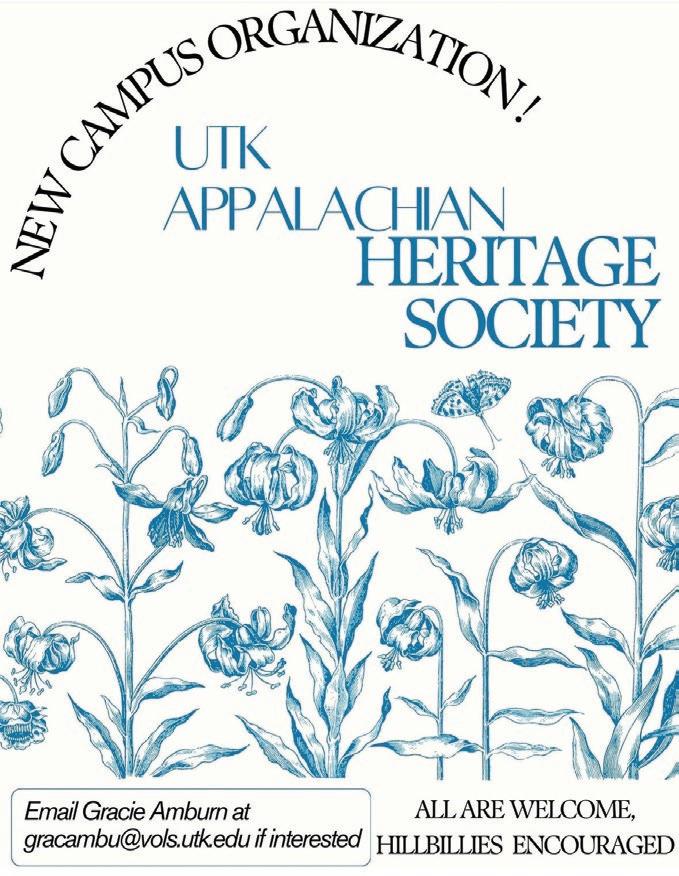
The UT Appalachian Heritage Society aspires to elevate Appalachian communities and their voices. Courtesy of Gracie Amburn
Leaving home to go off to college is hard enough for students from the U.S. For international students studying abroad, coming to live in a different country can be even more overwhelming.

Luckily, UT creates a home away from home for those looking to further their education all while experiencing new cultures.
Ambrosia Sip — a first year student studying for her masters in French and Francophone studies — transferred to UT after receiving a bachelor’s degree in fine arts at the University of Lille located in North France.
Sip had never lived outside of her home country — France — nor had she come to the U.S. before becoming a student at UT.
“I didn’t have a culture shock at the beginning, but I am shocked about the people,” Sip said. “Everyone is really friendly and welcoming. … I love the mentality here.”
Marie Fettah — a second year student studying for her masters in French and Francophone studies — transferred to UT after receiving a masters in international master of audiovisual and cinema studies at the University of Lille. Fettah received her bachelor’s degree in performing arts in audiovisual and cinema at Aix-Marseille University in the South of France, where she is from.
“My home will always be Marseille
where my family is, but I did feel welcome here,” Fettah said.
New adventures always come with new challenges. For Fettah and Sip, one of their challenges has been adjusting to the U.S. college workload.
“There are a lot of assignments and exams,” Sip said. “It is hard to have free time,”
Fettah also expressedthat the workload is not the same as what they are used to back home, and she felt overwhelmed during the beginning of her time at UT.
“In France, you have a presentation in the middle, and then you have a paper in the end,” Fettah said.
Despite the vast amount of work to submit for classes, Sip and Fettah enjoy the progressiveness of the courses offered to UT students.
“You have a lot of diversity in courses,” Fettah said. “There are also more courses. In France it is more restricted. … I studied the perspective of gender and sexuality, and in France we are really, really light about that.”
The advancement of studies in the U.S. was a big appeal to Fettah, and she enjoys being able to openly express her opinions with her peers and professors.
Other challenges Sip and Fettah have faced in the U.S. have been public transportation and finding ways to eat healthy.
“I was warned before that there was little public transportation but I didn’t understand the extent of it,” Fettah said. “The buses are problematic, so it is really complicated.”
Neither Sip or Fettah own cars, leaving them extremely reliant on public transportation. UT provides transportation to and from campus, but getting to the grocery store or other non-affiliated university locations is difficult.
The dining options available on campus are not ideal for someone trying to keep a healthy lifestyle.
“I eat very, very bad here,” Sip said. “Here it is really salty or really sweet or really fattening.”
With limited free time and transportation, Sip finds it hard to cook healthy meals and keep active. The Big Orange Pantry — a resource provided by UT — has been very useful to Sip, providing free vegetables and other items to students.
While Knoxville is far from home to Sip and Fetta, the memories they have made in this journey will be something they take with them back to France.
SHELBY WRIGHT News Editor
In 1860, the two-party system of the United States was created, and since then, the Democratic and Republican parties have been determining the fates of how Americans live their lives. Their never-ceasing strifes and debates over morals, race and policy have created a human-made chasm between American people based on which political party they choose to affiliate or not affiliate themselves with. In recent years, this chasm has only deepened as modern media has pushed and strengthened harmful stereotypes and disinformation against opposing parties, leaving it difficult for any American to simply remain neutral.
Elijah Boatwright is a junior studying political science and economics, and he currently serves as the president of College Republicans at UT and the vice president of the Tennessee College Republicans statewide federation.
Boatwright told The Daily Beacon that he has always felt strongly about his political beliefs, but he does not believe his political affiliation as a Republican affects who he is as a person.
The acceptance Boatwright found at College Republicans helped him transition with his move from California to Tennessee during his freshman year and helped him to find friends.
However, while the organization allowed conservative students like Boatwright to freely express their opinions without fear of social or academic ostracization, he does not attribute it to shaping his identity.
“My political affiliation is a secondary byproduct of my fundamental values and character, not the other way around,” Boatwright said.
Boatwright said that he affiliates himself with the Republican Party because he believes in the ideological foundations that make the party flourish — traditionalism, virtue and a moral society.
Kennedy Davis is a senior studying political science and serves as the membership coordinator for the College Democrats at UT.
Davis told the Beacon that she is a Democrat because she is a young woman who grew up with a single mother and saw how liberal policies were always able to help her family during difficult times.
Now that she is older, Davis said that she affiliates herself with the Democratic Party because she believes that the party represents a people who care about the rights and liberties of all people, no matter their status, beliefs, race, gender or ethnicity.
While Boatwright and Davis exist on opposing sides of the political spectrum, they do have some similarities. They are both Chris-
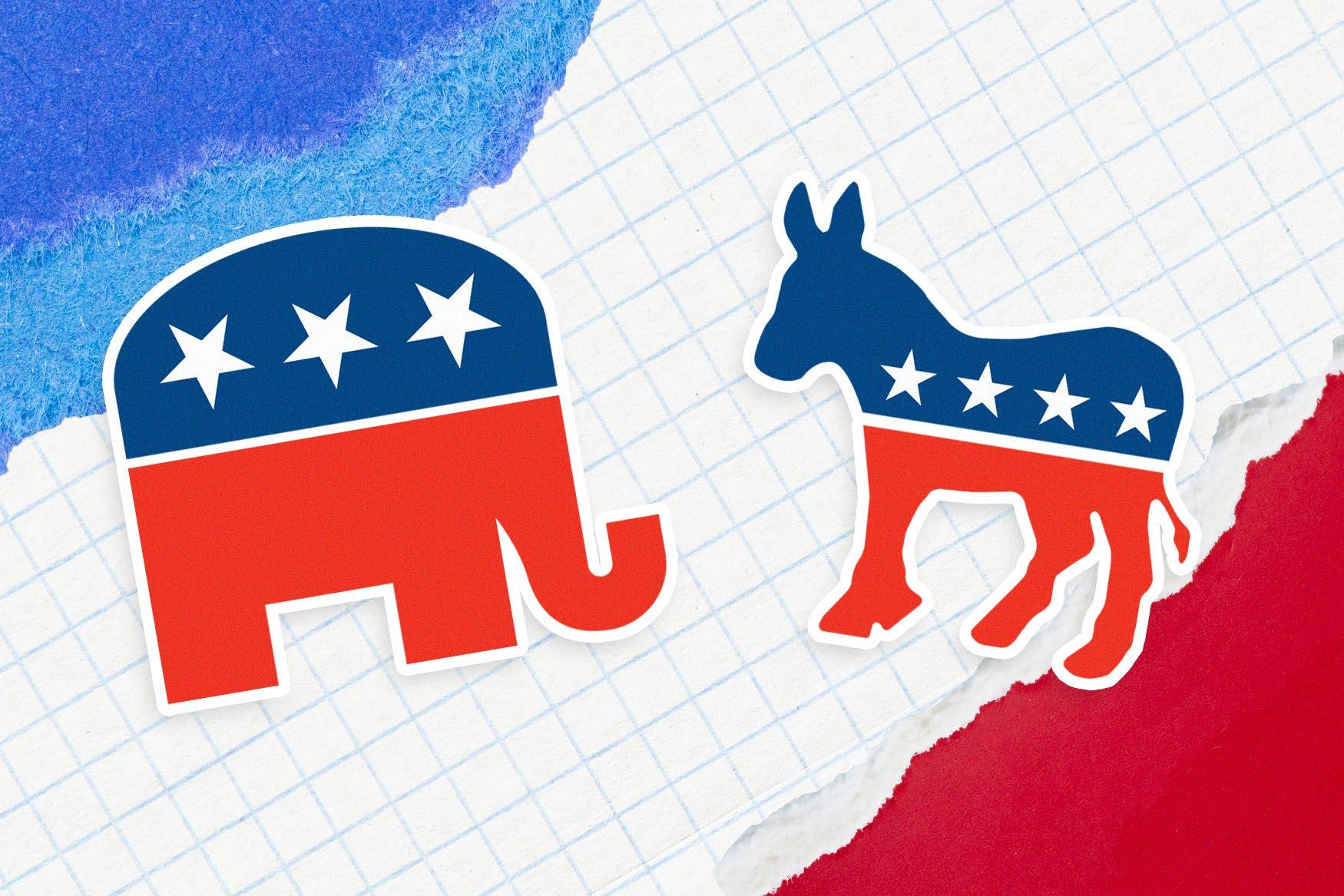
tians, and they agree that it is important for all Americans to be politically involved. They also said they believe that all sides should be heard, and that all opinions and people — even if they are different, should be valued.
“Always assume the best out of other people and treat others with inherent dignity and respect because everyone is equally valuable before God,” Boatwright said. “No matter how much you disagree with them.”
Davis said that one of the most harmful stereotypes she has heard is that Democrats are “anti-Christian” because of their prochoice beliefs.
“While I am pro-choice, I also believe in God,” Davis said. “I cannot speak for all Democrats, but I believe that women, as well as all people, have a right to make decisions about their bodies and be able to make choices regarding their health. … It is a medical procedure that should be available to all women regardless.”
Boatwright said that the most common misconception is that Republicans are hateful and do not care about anyone but themselves.
“Conservatives love all people,” Boatwright said. “However, we also recognize that love is not synonymous with acceptance and tolerance but with telling the hard truth that peo-
ple need to hear, not necessarily want to hear. People often mistake this for hate.”
Boatwright and Davis’ opinions cannot speak for all who identify as Republican or Democrat, as there are factions and differences of opinion even within these parties.
America is a melting pot of cultural identities, belief systems and ideologies that come from people influenced by societies worldwide. Freedom remains of the utmost importance and the achievement of the “American Dream,” however one may define it, still exists.
Without politics, America would not exist, so there is no shame in letting it cultivate your identity, according to Boatwright.
“Political affiliation is important because politics is important, which is simply the study of how a society ought to be properly governed. Everyone should have some stake in how they want their society to look like,” Boatwright said.
Just because someone has a different opinion does not mean they should be scrutinized for it. Each political party has ideas and beliefs to offer to society that can be beneficial.
A study conducted by Stand Together suggested that political division is much less about policy and more about a false narrative
fueling comparison and emotions of hatred towards one another.
Politicians no longer simply debate policy — they attack one another for who they are and what they seem to represent. So when it comes down to it, Americans either stand proud by the side of their party, fueled with empowerment derived from a “we are better than thou” mentality, or they are left feeling ashamed of their values.
It is important to note that while looking for sources for this article, it was difficult to find people willing to go on the record, out of fear of being scrutinized by the public.
This says a lot about the current state of our nation and the changes that need to be made. Political identity at its core is not harmful, but the way people treat and perceive others who do not share their beliefs is, according to Davis.
“I do not have any hate in my heart towards individuals who do not share the same cultural values,” Davis said. “But in light of the upcoming election, I think that it is important that we respect each other and treat each other with kindness because, at the end of the day, we are all Americans — we will remain one country, under God, with liberty and justice for all.”
BELLA HUGHES Editor-in-Chief
Often misinterpreted for Pride Month in June, Pride History Month is the lesser-known celebration of LGBTQ+ community. According to the official Pride History Month website, a Missouri
The Lambda Gay and Lesbian Student Union challenged the lack of policy in the protection against LGBTQ+ employees. At the time, there was no federal law that protected LGBTQ+ people from discrimination in a work environment, including hiring an employee.
“The Equal Employment policy does not include gender orientation as a protected class (of individuals),” Philip Scheurer, former vice chancellor of administration and student affairs said in an interview with The Daily Beacon in 1996.
Lambda created a petition that was then transformed into a bill presented to the Graduate Student Assocaiation. The GSA passed the bill and it was then sent to SGA for approval.
Series of Pride Center vandalism attacks hit campus
Four separate vandalism attacks took place at The Pride Center, causing former Chancellor Jimmy Cheek to send a public message to students and staff.
The series of attacks included flag vandalism twice, hate messages left at the center’s doorstep and the university suggesting that the flag be taken down. This led to a rally hosted by the College Democrats and several fundraising events.
The attacks stopped after the second suspect was identified and Cheek notified campus.
Pride Center relocates to Student Union
In August 2021, The Pride Center opened the doors to its new location in the Student Union. After being stripped of its funding and no longer being recognized as a university-affiliated organization, alumni, students and faculty hosted a series of fundraisers, walkouts and marches to get the center recognized once again. The center regained its funding and reopened under the Bonnie Johnson’s leadership as The Pride Center coordinator.
Today, The Pride Center resides in this space and serves as a safe zone for LGBTQ+ students and provides programming and resources to community members.
high school teacher believed there should be a month to recognize the history and honor the activists of the LGBTQ+ community. National Coming Out Day takes place in October, and thus, this month was chosen as the perfect fit for national recognition.
Here are four monumental moments in Queer history at UT.
Administration doesn’t agree with a nondiscrimination clause
After the bill to include a nondiscrimination clause based on sexual orientation was passed in a 56-13 vote by the GSA and SGA, administration had opposing viewpoints.
Former Chancellor Bill Snyder vetoed the bill upon recommendation from former Vice Chancellor Phil Scheurer. Scheurer wrote a recommendation letter to Snyder which stated, “‘Sexual orientation’ is not similarly covered by any Tennessee or federal law, and thus including that class (of people) presents a real inconsistency in our logic for iterating the classes that we presently do (protect).” In addition, Snyder argued that “gender complaints” were handled by a separate department — therefore sexual orientation matters did not need to be including in the policy.
Snyder later announced his support of adding a sexual orientation clause in 1999. It wasn’t until 2007 that the equal employment opportunity clause was updated to reflect nondiscrimination against sexual orientation.
The Pride Center reopens after Office of Diversity and Inclusion defunding
The Office of Diversity and Inclusion lost funding and inevitably had to close the doors to the Pride Center in May of 2016. The center reopened in August of 2016, just in time to welcome students for fall semester. In its reopening, Pride Ambassadors — an unpaid group of students who arrange and lead programs at the Pride Center — were introduced to serve as mentors for students in the LGBTQ+ community.
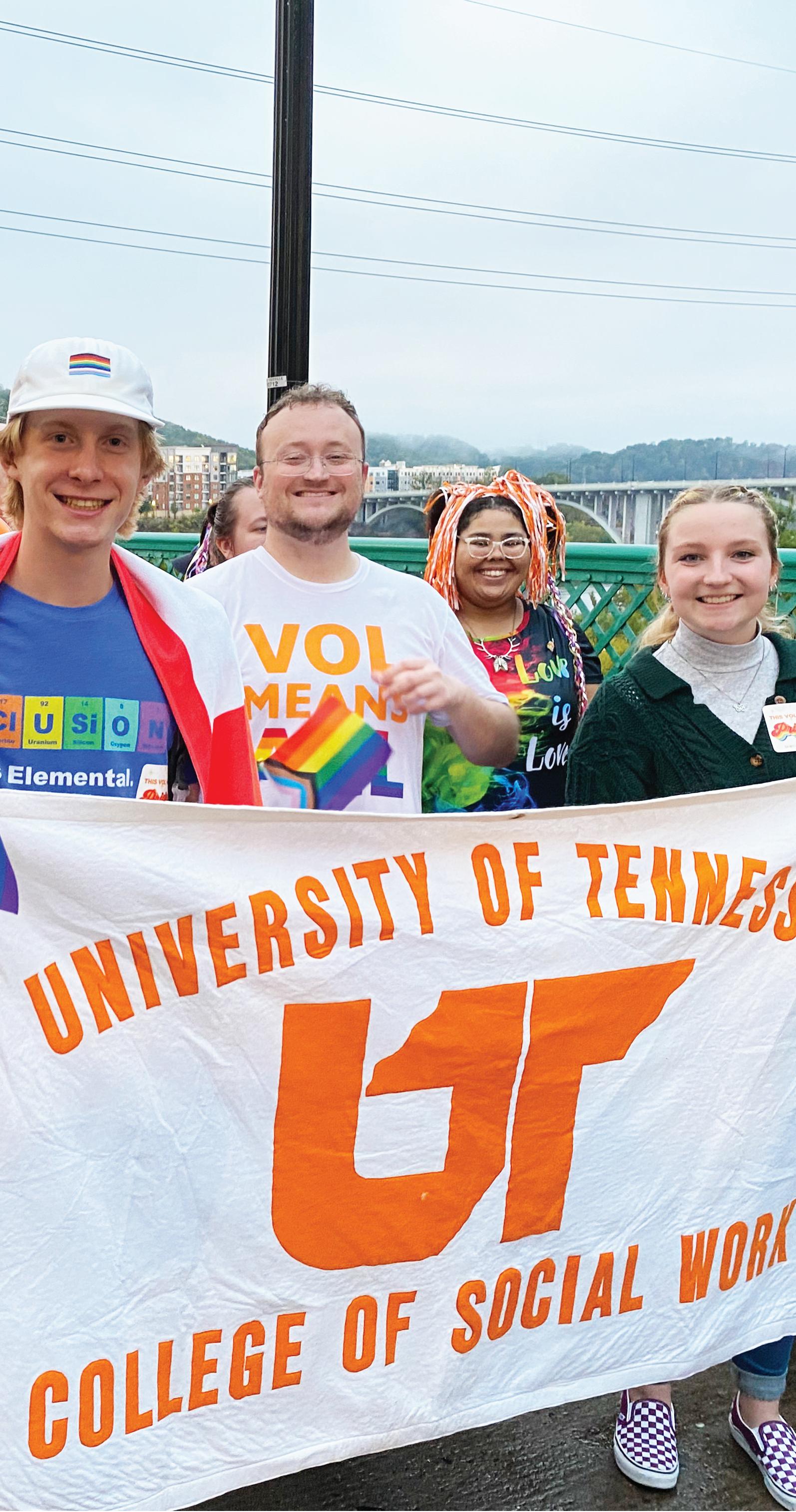
LOUIE PERRY Staff Writer
Politicians, specifically presidential candidates, have historically tried to win over specific communities and demographics, no matter the election year.
Over the years, however, the communities that Republicans and Democrats have targeted have changed with time. Their messaging to specific groups and the attention they give to various communities have also changed and become more strategic, as identities one party counted on have shifted to the other side. The question now is, how can they win back those votes or replace them with other groups?
Synonymous with the Democratic party has been the loyal base of African American and Hispanic voters. However, that has recently begun to change.
“African Americans and Hispanics have historically been reliable members of the Democratic Party coalition. ... Polling suggests a marginally lower level of support in this year’s presidential election,” Dr. Bill Lyons, professor of American politics and voting behavior, said.
In recent elections, Black Americans have continuously and overwhelmingly voted for the Democratic Party. John Kerry, the white Democratic nominee for president in 2004, carried 88% of the African American votes, and when Barack Obama ran for president in 2008 as the first Black American to win the nomination of one of the two major parties, he won 93% of the African American votes.
“However, more recently, since the 2012 presidential election, we have seen an uptick in African American men voting more Republican. African American men still remain largely Democratic Party supporters. … However, there is an increasing gender gap between Black men and Black women’s support of the Democratic Party,” Dr. Shayla Nunnally, head of Africana Studies and professor of African American Politics, said.
According to the Gallup Research group, Black Americans’ voter preference for the Democratic Party over the last three years has shrunk by 20 points. In the Black community, there’s even a disconnect between young and old voters. Black voters above 50 align with Republicans 7% of the time, while those under 50 align 17% of the time. The highest group of those who pledged support for former President Donald Trump comes from 18-29 years old.
Researchers have speculated why these shifts have occurred for Black Americans,

and the reasons are “complex, including concerns about crime, immigration and spending on international conflicts,” Lyons said.
Some say the shift comes from not associating politics with the Civil Rights Movement as Black voters once did, while others say they haven’t seen the real change that they’ve been promised by candidates over the years.
With many promises specific to the Black community and never acted on, Black Americans have become anxious with the Democratic Party. For example, in 2020 President Joe Biden promised sweeping criminal justice reforms, referring to a justice system that had targeted Black Americans for years. Yet, since in office, Biden has been unable to push forward the reforms he had hoped, for various reasons such as gridlock in Congress or other policies he has prioritized over criminal justice reforms.
Trump passed the First Step Act in 2018 which addressed some concerns of criminal justice reforms, and released 26,000 incarcerated Americans. Some Black voters have felt their vote has been taken advantage of, and Trump’s action on this issue is more than they saw from the Democratic party.
This same issue of shifting voting blocks applies to the Hispanic community. In recent election data, Democrats now have a 12-point advantage, a historical low. Since 1976, however, a majority of Hispanic voters have voted for a Democratic candidate
sters President Sean O’Brien took center stage, on which he highlighted the voices of union members. Though there was no endorsement for Trump, it still sent a message. Historically speaking, Republicans have looked down on organized labor — which is why it was unprecedented to highlight one of the largest unions on the Republican stage.
According to the internal polling of the Teamsters, members supported Biden over Trump by an 8-point margin, 44-36%. However, with new polling in a Trump versus Harris matchup, the results were 60% Trump and 34% Harris with a second poll showing 58% Trump and 31% Harris.
Recently, Republicans have helped bring in a larger vote count in non-college-educated voters than in recent history.
Moderate Republicans and college-educated voters
for president — but that may change with recent events and policy issues. Polling shows that Trump is garnering close to 45-47% of support from Hispanic voters, whereas in 2020 he only received 32% of the Hispanic vote.
“Another intersection to consider for Latinos is religiosity and Catholicism, which if abortion is a leading issue among Latinos, Trump’s emphasis on this issue may attract voters,” said Nunnally.
For many non-white groups, Trump’s populist and America-first rhetoric speaks to their issues. With many Americans focused on the state of the economy and the ability for economic mobility, some have attributed this to reasons why the shifting occurred in these groups.
Union members and blue-collar workers
The same economic rhetoric that has resonated with minority groups has also struck a chord among working Americans and union members. The International Brotherhood of Teamsters — a 1.3 million member union — did not endorse Vice President Harris this coming cycle. That’s the first time it hasn’t endorsed a Democratic candidate for president since President George H. W. Bush in 1988.
Blue-collar workers have been a steady voting group for Democratic candidates for years, with President Biden earning numerous union endorsements in 2020.
At the most recent Republican National Convention in Milwaukee, Team-
For Kamala Harris, her team has increased support from the vocal anti-Trump voters. Her team has amplified Republican voices including the likes of former Vice President Dick Cheney and former congresswoman Liz Cheney, as well as others such as former congressman Adam Kinzinger, who spoke at the Democratic National Convention.
Harris appeals to those who may have been a part of the Republican party in the past but dislike the personality and manner of Trump.
Democrats have also seen an increase in college-educated white Americans. The Republican party used to be that of the college-educated party, but it reached its peak in 2008, shifting to more blue-collar voters. In 2008, the Democratic Party garnered 31.5% of the educated voters but rose to 52% in 2020 in unprecedented numbers.
In heavy swing states such as Georgia, North Carolina and Arizona, collegeeducated white voters shifted away from Trump by double digits.
With shifting demographics and communities voting for differing groups that would have been unheard of 50 years ago, political parties and candidates have shifted their messaging and their campaigns to reach out to groups that were never seen in their “tent” of voters in the past.
However, it is still questionable whether either campaign will be able to count on their usual voter blocks yet also add communities that they haven’t seen before. The game is all addition. Each decision is about adding, not subtracting, and with polling showing very tight margins and some saying the election will come down to a few thousand votes, the question is, who can add more than the next?

ANSLEY GRAVES Opinions Editor
Attention Deficit Hyperactivity Disorder is a disorder that many people deal with 365 days a year, but October is the one month that signifies awareness. As someone who was diagnosed with ADHD almost eight years ago, I feel like there are a lot of unspoken misconceptions and unknown truths about having this disorder.
People often can associate this disorder with merely having trouble focusing or being a little bit too hyper, but I would like to set the record straight — there is much more depth to having ADHD than people think.
I first was diagnosed with ADHD when I was around 13, yet I didn’t understand the full extent to this, as I too thought that it was just a fancy way of saying I had a short attention span — although that was no secret when my diagnosis was confirmed. In school, teachers made small suggestions that I needed to get back to work, or not talk so loud, or just in general to calm down.
It’s like my mind was doing backflips and I

Opinions Editor Ansley Graves reflects on October being ADHD awareness month and shares her personal experiences on managing it throughout a day to day in her social life. Ansley Graves/ The Daily Beacon
had so much to say, yet the words could never come out right. After one too many warnings in school, this information was of course relayed to my parents, and so the journey began.
When we received the papers of my test results, there it was: On the 1.0 point maximum scale, in a bold red bar, read the corresponding numbers, 0.99999. I was not familiar with this scale used for the tests I was given, but in simpler terms, it was off the charts.
If you are someone with ADHD, you know how the whole process of trial and error goes with our medication. You are given dozens of
different types to experiment with, and if it doesn’t work or affects your body badly, you just have to learn the hard way.
After finally finding one that worked for me, my new routine was to wake up and take this medicine, because I knew if I didn’t, I would not get anything done and I would fall back into my old ways.
Flash forward eight years, my brain has developed and matured more, which has made me realize a few things about myself and how I identify with ADHD.
I realized that this disorder not only affects my daily life, but social relationships, overall mood and well-being. In terms of my daily life, I find myself having no trouble completing tasks, but at what cost? My medication makes me feel like I am on top of the world for a few hours, but as the end of the day approaches, I feel like a zombie coming back from the dead.
Additionally, ADHD can sometimes make people sabotage their relationships in their social or love life, with no intent to. Jumping quickly at opportunities and having fast detachment is something that is all too familiar with someone who has ADHD.
Even having the same comfort food for months and then one day randomly despising it, is something that just becomes a norm. While the list goes on and on for what symptoms or norms you experience with ADHD, just know you are not alone, and you are doing great. The next time you think your ADHD friend is being a little bit too loud or maybe even too quiet, keep in mind they are doing their best.
Ansley Graves is a junior at UT this year studying journalism. She can be reached at agrave24@vols.utk.edu.
Columns and letters of The Daily Beacon are the views of the individual and do not necessarily reflect the views of the Beacon or the Beacon’s editorial staff.
Solution to Crossword:


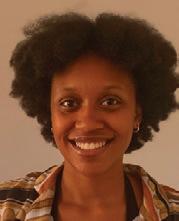
This week, we will be addressing a submission that speaks to a very common — yet unspoken — issue in relationships.
The question reads: “Throughout my relationship, me and my partner have been pretty happy, but I find myself enjoying/wanting sex less,l to the point I would feel happy not having it at all. I don’t know how to bring it up to my partner since he’s a lot more enthusiastic and wants it more than I do. What would be a good way to start a conversation about our different sex drives?”
This question touches on two important topics that we’d love to bring to light — interpersonal communication and understanding your own sexual identity.
Since National Coming Out Day has just passed, this article suggests some ways to navigate these conversations with your partner and provide some insight on the sexuality spectrum and asexual identities.
A decrease in libido is very common in many people’s lives. It can happen for a variety of reasons ranging from relationship issues, stress, hormonal changes or simple natural fluctuations that come with being in a long-term, committed relationship.
Generally, these situations are universal, but there are certain hormonal issues that could be the cause of a decreased libido. For assigned male birth folks, impotence, performance anxiety or premature ejaculation could be the cause. For assigned female at birth people, the issue may lie in menopause, vaginismus, pregnancy or an infection.
Now, you shouldn’t assume that all changes in your libido are caused by medical issues. As we’ve said before, it fluctuates. If you experience a drastic decrease in sex drive and nothing you’ve tried is working, you could seek outside help. This help could come in the form of your doctor or psychiatrist, a sex therapist, a gynecologist or a urologist. It is also possible that this shift could be signaling a deeper change and cause you to reexamine how you experience sexual attraction. Understanding your own feelings is key to starting this conversation with your partner.
Talking about sex — especially about wanting it less — can feel scary and daunting, but open communication is essential for maintaining a healthy relationship. Here are our tips for approaching this conversation.
1. Get comfortable: Choose a time when you’re both relaxed and ensure your surroundings aren’t distracting. Try not to open the discussion as an accusation or place any blame. You’re a team working through something important.
2. Be honest but kind: Express how you’ve been feeling candidly. You can address all of your concerns, even if it might feel awkward, without making your partner or yourself feel guilty about having differing sex drives. You could say, “My interest in sex has changed, and I’d love for us to talk about how we can navigate this together.”
3. Discuss new labels if applicable: If you suspect that your change in libido is due to a change or development in your sexual orientation, be honest about that. If you suspect that you might fall somewhere on the ace spectrum, sharing resources with your partner can help them understand the way that you experience attraction. Outlets like The Trevor Project and Ace Week are great places to explore resources.
4. Work together on solutions and plans: Once you’ve started the conversation, the hardest part is over. Now, you can work together to brainstorm ways to meet each other’s needs. This could involve exploring different kinds of intimacy, setting new boundaries or finding ways to bridge your desires. Sometimes, these talks don’t end ideally, and that’s OK. It’s better to communicate your needs and come to a decision that’s the best for the both of you rather than suffer silently.
According to the Sexuality Wiki, asexuality is defined as “the lack of sexual attraction to anyone or low or absent interest in sexual activity.” This definition is quite rigid, so we’ll dive a bit deeper. Asexuality, like most sexualities, is a spectrum. Though you may be comfortable calling yourself a particular label — like heterosexual, bisexual or even asexual — the way that you experience sexual attraction will differ from those sharing the same label. Sexuality is spe-

Columnist Renee Hamlin says, “Whether you’re questioning if you fall on the ace spectrum or are just dealing with a temporary drop in libido, it’s important to honor your feelings and desires.”
Ansley Graves/ The Daily Beacon
cific to each person and changes and flows more often than people think.
Under the umbrella of asexual, there are many identities that may not fit within your preconceived notion of asexuality. Asexual people may experience little to no interest in sex, but desire intimate emotional connections, or, they may be sex-favorable and have it casually.
Other ace people may also identify as aromantic. Two of the most common — as in, known by the most people, not with the largest communities — identities and terms on the ace spectrum include greysexual — someone who may or may not, occasionally, experience sexual attraction — and demisexual — people who experience sexual attraction towards those they have formed an emotional connection with.
For more information, take a look at this cool list by the Oxford University LGBTQ+ Society.
It’s also important to remember that there are many ways to experience attraction that don’t fit neatly into the groups of sexual or romantic. For example, folks can feel aesthetic attraction, which is an appreciation for someone’s appearance without any desire for a deeper relationship.
Most of us experience platonic attraction. We want a close, emotional connection with someone that’s not romantic. In some cases, people are in queerplatonic relationships which The Trevor Project defines as “People who experience a type of non-romantic rela-
tionship where there is an intense emotional connection that goes beyond a traditional friendship.” Everyone experiences attraction differently, and none are more valid than others.
Everyone’s Journey is Different
Sexuality is a fun, fluid thing and everyone’s journey with it is different. Whether you’re questioning if you fall on the ace spectrum or are just dealing with a temporary drop in libido, it’s important to honor your feelings and desires. Successful relationships thrive on mutual understanding and honesty.
Let’s continue having these important conversations and remember—you’re never alone in navigating these experiences.
We want to hear from you! If you have questions, no matter how “obvious” or taboo or awkward they might feel, we’re here for that. You can submit your questions in our anonymous form and keep up with us on Instagram @seatutk.
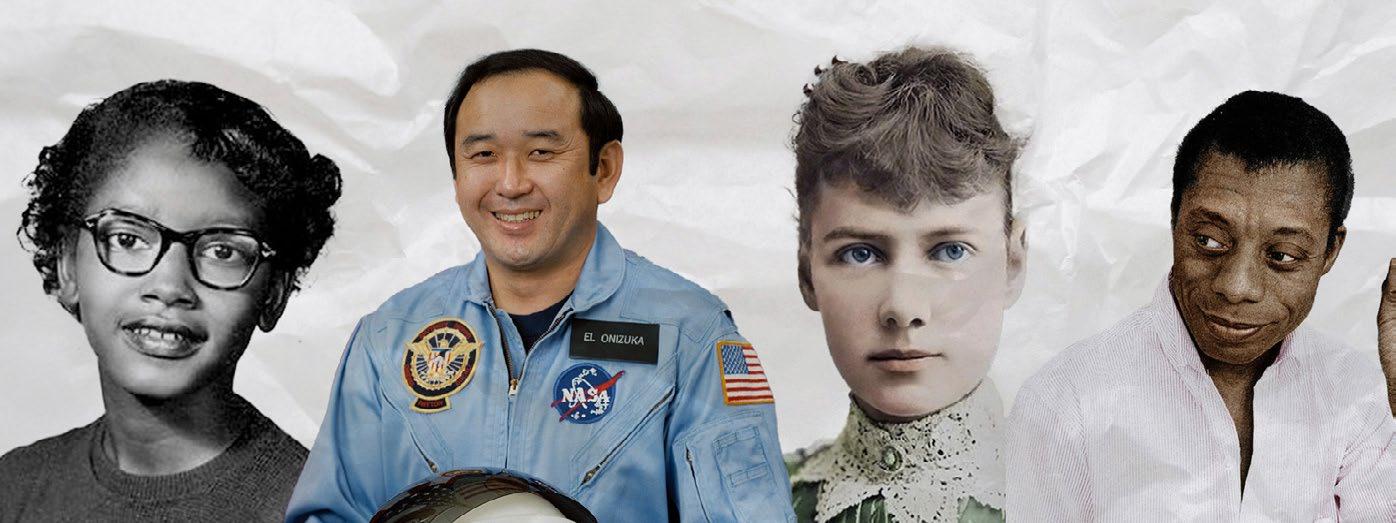
Figures including Ellison Onizuka paved the way for identity. Emma Fingeret / The Daily Beacon
CADEN
DYER
Copy Chief
Taking a stand for your identity can be something deeply moving and difficult to accomplish. Our world shouts a message of conformity and analogousness. Suddenly everyone is wearing the same trends and saying the same phrases.
While some names are immediately recognizable, others are less known yet equally impactful.
The first Rosa Parks
Rosa Parks’ name is commonly recognized. She was the woman who famously took a stand (or a seat, rather) on a bus in Montgomery, Alabama. When the bus driver ordered Parks to leave her seat in the “white” section, Parks refused and was arrested. The NAACP championed her in the following boycott of many buses.
However, Parks was not the first colored person to lay claim to their seat on a bus. Claudette Colvin was. At just 15 years old Colvin refused to give up her seat.
Fueled by her recent learning about the African American people and the Constitution in school, Colvin remained seated and was arrested.
“It felt like Sojourner Truth’s hands were pushing me down on one shoulder and Harriet Tubman’s hands were pushing me down on another shoulder, and I could not move,” Colvin said.
Mental health meets pseudonym meets feminism
You may have heard of Nellie Bly. You probably haven’t heard of Elizabeth Cochran.
They were one and the same: born Elizabeth Cochran, “Nellie Bly” was a female journalist for Joseph Pulitzer’s New York World in the late 1800s.
Bly was able to gain admission to Blackwell’s Island insane asylum for women on pretense that she was insane. Bly spent 10 days at the asylum. Once let out, she wrote one of the first reports on women’s mental health and how it is treated.
Bly’s article produced from this experience gave her a permanent position with the World newspaper, and she wrote a book on her time at
the asylum as well, entitled “10 Days in A Mad House.”
Blazing trails in space
Space saw its first Asian American in Ellison Onizuka.
As a NASA astronaut, engineer and test pilot for the Air Force, Onizuka contributed to multiple NASA missions and worked as a manager for engineering support at an air force base in California, registering over 1,700 flight hours there.
On January 24, 1985, Onizuka was launched along with the space shuttle Discovery and spent 74 hours in space. Onizuka was also the first person of Japanese origin to be in space.
Onizuka was promoted to colonel after her death and received the Congressional Space Medal of Honor.
NEA gives the Ellison S. Onizuka Memorial Award to “a nominee whose activities in Asian and Pacific Islander affairs significantly impact education and the achievement of equal opportunity for Asians and Pacific Islanders.”
The true brooding poet
As the gay liberation movement swept through America, Baldwin was writing and composing works that pushed ideas already blooming in others. Baldwin — who was himself gay and African American — searched for his identity while encountering masculinity and homosexuality. He also explored themes like antisemitism and Black America.
At 24, Baldwin realized he was headed for the often-traveled road of despair other AfricanAmerican men like himself experienced.
“To be a Negro in this country and to be relatively conscious is to be in a state of rage almost all of the time,” Baldwin said in an interview in 1961.
Baldwin moved to Paris, France, and it was there that his work “Go Tell it on the Mountain” was published in 1953. It was ranked as one of the top 100 English language novels by Time magazine.
Baldwin eventually returned to New York and continued to produce works in which homosexual themes were prominent. He advocated for social justice and became a professor and public figure, while continuing to publish numerous writings.






Alabama 17 at tennessee 21
nebraska at indiana miami at louisville
michigan at illinois lsu at arkansas georgia at texas
south dakota state at north dakota state
Alabama 30 at tennessee 22
nebraska at indiana miami at louisville
michigan at illinois lsu at arkansas
georgia at texas
south dakota state at north dakota state
Alabama 31 at tennessee 13
nebraska at indiana miami at louisville michigan at illinois lsu at arkansas georgia at texas
south dakota state at north dakota state
Alabama 21 at tennessee 17
nebraska at indiana miami at louisville michigan at illinois lsu at arkansas georgia at texas
south dakota state at north dakota state
Alabama 14 at tennessee 21
nebraska at indiana miami at louisville michigan at illinois lsu at arkansas georgia at texas
south dakota state at north dakota state
Alabama 24 at tennessee 28
nebraska at indiana miami at louisville
michigan at illinois
lsu at arkansas
georgia at texas
south dakota state at north dakota state
















